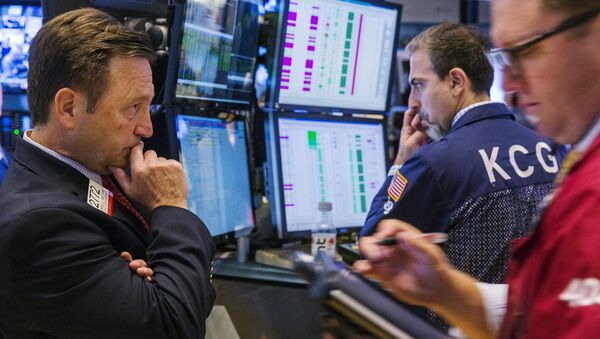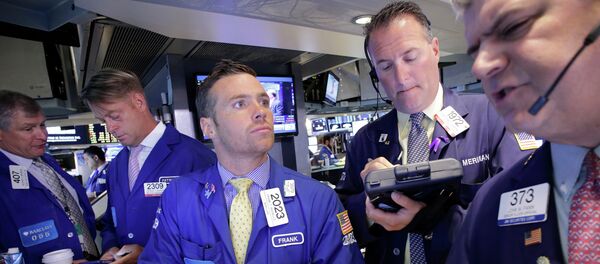Kristian Rouz — US shares have been seen flat at the open on Monday, with the Nasdaq Index having hit its third consecutive record high before an insignificant retreat. While investors' general sentiment is bullish amidst the optimistic corporate earnings expectations being confirmed so far, in the tech sector in particular, a decline in raw materials producers left market participants feeling cautious, resulting in less buying bets — at least, until tech heavyweights like Apple Inc. post their Q2 profits.
The S&P 500 Index was 0.07%, or 1.43 points, down, at 2,125.15 points, at 10:44 AM in New York, trading now just six points below its fresh all-time highest. The Dow Jones Industrial Average Index, fluctuating between gains and losses, was last 0.07%, or 11.79 points, up, at 18,098.25. The tech-driven Nasdaq Index is flat currently, with traders awaiting fresh reports from the listed companies. Thus far, any company posting earnings above previous expectations will trigger an over-the-top buyout in shares.
However, there is a lot more to the market situation than just the corporate figures. While some profit statements are indeed better than anticipated, the yearly gains in US corporate profits are mostly lackluster, with a stronger dollar eating off a large part of the overseas-generated income, while the domestic US market is flooded by cheap imports, and competition is fierce.
Among all those enterprises having reported their profits so far, 71% beat previous expectation, a good sign for the market, as that is above the average of 63% companies surpassing earlier quarterly profits projections usually. But in terms of revenue, only 51% of US firms beat forecasts, below the average of 61%.
This week, some 25% of the S&P-listed companies are reporting profits, and IBM is reporting later today. The IBM profits report is likely to determine whether the market will be up or down at the close. Market participants are also looking into any signals coming from the US Fed on whether and when the regulator is planning to move the interest rate. Also, the US jobless report is due this week.
The market volatility index VIX rose 1.2% today after having slumped dramatically last week by 29% as the Greek concerns eased.
Among the S&P sectors, energy and commodities were the worst performers, while tech and healthcare gained the most. US oil prices have declined for the fourth straight session, the likes of Southwestern Energy Co and Chesapeake Energy tumbled (-3.1% each thus far), due to the renewed concern of oil oversupply as Iran is planning to double its crude output.
The Bloomberg Commodities Index slid 1.2%, bad news for America's lumber mills, coal and metal mines and other commodity producers and traders, as the measure is nearing its 13-year lowest. A sluggish demand for raw materials is an alarming signal for the broader economy as it indicates a weak development in infrastructure. Meanwhile, a stronger dollar also impairs precious metals, with gold tumbling.



